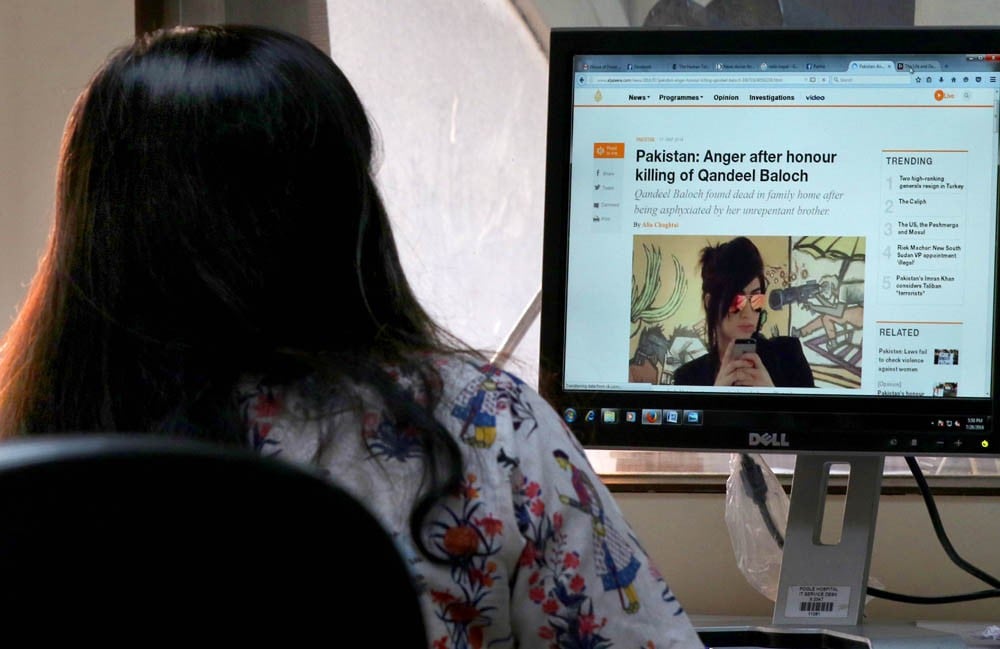
Qandeel’s killing is reshaping the social discourse around taboos that Pakistani society refuses to address

In Pakistan, the media trades in the currency of sensation on a daily basis. Scandal, innuendo and a voyeuristic streak characterise the predatory media’s spotlighting of popular -- or controversial -- figures. The appeal is further elevated with figures like Imran Khan, Sheikh Rashid, Bilawal Bhutto, Meera and Shahid Afridi, to name a few, who serve as equal targets of fascination and derision -- or who generate extreme sentiments for virtually everything they say or do -- for media’s audiences. For most such figures, media keeps their projects of peerage alive and in turn benefits from profits made by selling its scandal-obsessed consumers to its advertisers.
In this sense, the media and these ‘star personages’ are tied in a consensual symbiotic relationship that serves the interest of both parties -- giving media the audiences it needs to boost its advertising revenues and giving audiences to the personages to keep them ‘newsbyte relevant’ to advance their public careers. And because of the Darwinian nature of Pakistan’s ultra-competitive current affairs media, sensation is now often manufactured to retain the critical mass of its captive audiences if these personages start to wane at times with their public roles. The media space staging this spectacle extends to cyberspace too where the consumer-advertiser model is more diffuse but deals in numbers of people on a scale higher than that of electronic and print media combined.
But something strange has happened in the case of Qandeel Baloch, a small-town girl who rose to astonishing levels of recognition in this big country by capturing and retaining attention of audiences across formidable class, social and cultural divides. All this through her sheer bravado at defying tradition and by forcing people to look at their own hypocrisies in her aim to transcend over all social and cultural barriers. Her relatively short career span as a public figure -- just a few years in active spotlight -- has come to match, if not exceed, the power to keep audiences captive by even people with a much more powerful pedigree that she could ever boast of and who have been at the game for many more years than she had.
Qandeel’s murder -- in the name of ‘honour’ at the hands of her own brother -- has generated a socio-cultural shockwave that is refusing to subside. An astonishing number of articles, features, commentaries, analyses and opinion continue to be published, broadcast and placed on social media that is rare for even more popular figures than career celebrities. The sheer volume of space -- both on conventional and social media -- devoted to Qandeel, who she was, what she did and what is the significance of her murder, is shaping up to be a new contour in social discourse around taboos that Pakistani society still refuses to address with finality on the basis of enforcing fundamental rights.
For one, while her murder for ‘honour’ by a family member is hardly a new phenomenon in Pakistan -- indeed several high-profile cases in 2016 alone have emerged in Sindh, Punjab and Azad Kashmir that have agitated the media and the state -- the Qandeel murder has actually forced the parliament and government into accelerating legislation focused on deterrence and severe response to possible future murders in the name of honour. This alone -- an issue leading to tangible policy outcomes -- is a testament to what the Qandeel phenomenon signifies in symbolic terms. And this after being murdered.
But perhaps more significantly, Qandeel is emerging from beyond her grave as the conscience of media itself. Introspective perspectives from within media are growing in acknowledging voices from within a broad spectrum of civil society that Qandeel was aided in her needless murder by the media itself. This ‘mea culpa’ is a rare phenomenon and the way a growing number of media practitioners themselves are writing and talking about how the media at times goaded and at others forced Qandeel into adopting postures on issues and events that forced the hand of the more emotional and extremist sections of society into painting her as a target waiting to be hit.
This -- the shady role of manufacturing news rather than reporting and dissecting news -- has long needed examination in Pakistan’s context. In a country riven by divisions and conflicts, from religious to sectarian, from nationalist to provincial, from ethnic to linguist and from social to economic, how media navigates the tension between its essential function of profit-maker and being the guardian of public interest also ends up seriously influencing how people come to perceive issues and how they end up resolving or exacerbating them.
A few years ago it was Salmaan Taseer’s murder aided in no small part by the media. Now it’s arguably the instance of Qandeel Baloch. Who will be next? There need not be a next if media goes back to the basics of professionalism.